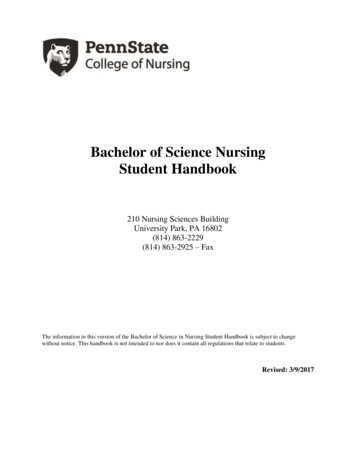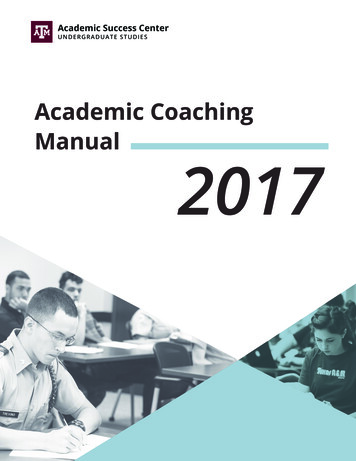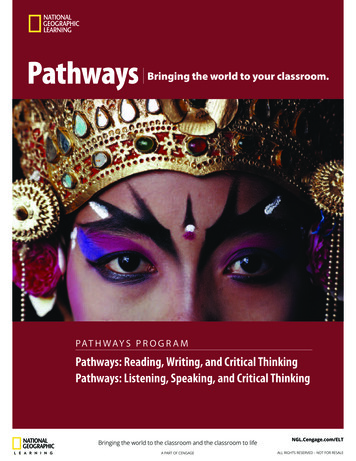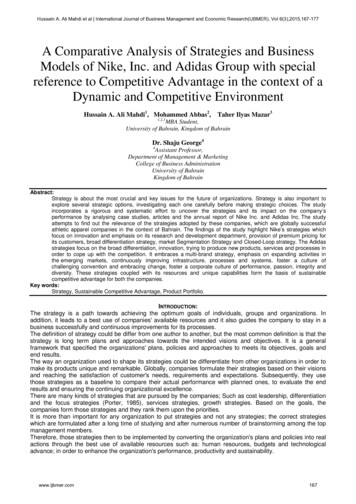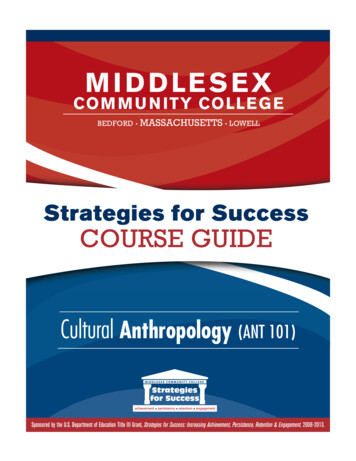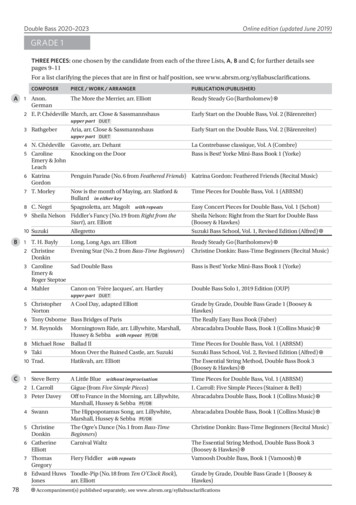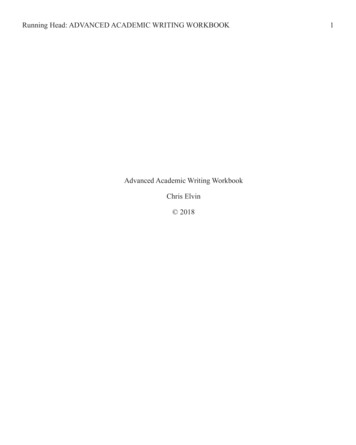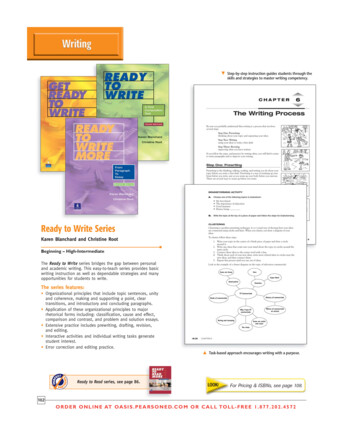
Transcription
Strategies forAcademic Success
2Strategies for Academic SuccessHow to Read a Math TextbookStrategies for Academic Success How to Read a Math TextbookReading a textbook is very different than reading a book for fun. You have to concentrate more on what you are readingbecause you will likely be tested on the content. Reading a math textbook requires a different approach than readingliterature or history textbooks because the math textbook contains a lot of symbols and formulas in addition to words.Here are some tips to help you successfully read a math textbook.Don’t Skim Use Available ResourcesWhen reading math textbooks, look at everything: titles,learning objectives, definitions, formulas, text in themargins, and any text that is highlighted, outlined, or inbold. Also pay close attention to any tables, figures, charts,and graphs.Many textbooks have companion websites to help youunderstand the content. These resources may containvideos that help explain more complex steps or concepts.Try searching the internet for additional explanations oftopics you don’t understand.Minimize DistractionsRead the Material Before ClassReading a math textbook requires much moreconcentration than a novel by your favorite author, sopick a study environment with few distractions and a timewhen you are most attentive.Try to read the material from your book before theinstructor lectures on it. After the lecture, reread thesection again to help you retain the information as youlook over your class notes. Start at the BeginningUnderstand the MathematicalDefinitions Don’t start in the middle of an assigned section. Mathtends to build on previously learned concepts and youmay miss an important concept or formula that is crucialto understanding the rest of the material in the section.Highlight and AnnotatePut your book to good use and don’t be afraid to addcomments and highlighting. If you don’t understandsomething in the text, reread it a couple of times. If it isstill not clear, note the text with a question mark or someother notation so you can ask your instructor about it.Go through Each Step ofEach Example Make sure you understand each step of an example. Ifyou don’t understand something, mark it so you can askabout it in class. Sometimes math textbooks leave outintermediate steps to save space. Try working through theexamples on your own, filling in any missing steps.Take NotesMany terms used in everyday English have a differentmeaning when used in mathematics. Some examplesinclude equivalent, similar, average, median, and product.Two equations can be equivalent to one another withoutbeing equal. An average can be computed mathematicallyin several ways. It is important to note these differencesin meaning in your notebook along with importantdefinitions and formulas.Try Reading the Material AloudReading aloud makes you focus on every word in thesentence. Leaving out a word in a sentence or mathproblem could give it a totally different meaning, so besure to read the text carefully and reread, if necessary.Questions1.Explain how taking notes can help youunderstand new concepts and skills whilereading a math textbook.2.Think of two more tips for reading a mathtextbook. This is important!Write down important definitions, symbols or notation,properties, formulas, theorems, and procedures. Reviewthese daily as you do your homework and before takingquizzes and tests. Practice rewriting definitions in yourown words so you understand them better.Notes 9-25-17:- The opposite of a negative integer is a positive integer.- T o add two integers with the same signs add theirabsolute values and use their common sign
Tips for Success in a Math CourseStrategies for Academic Success3Strategies for Academic Success Tips for Success in a Math CourseRead Your Textbook/Workbook Do Your HomeworkOne of the most important skills when taking a mathclass is knowing how to read a math textbook. Reading asection before class and then reading it again afterwardsis an important strategy for success in a math course. Ifyou don’t have time to read the entire assigned section,you can get an overview by reading the introduction orsummary and looking at section objectives, headings, andvocabulary terms.When doing homework, always allow plenty of timeto finish it before it is due. Check your answers whenpossible to make sure they are correct. With word orapplication problems, always review your answer to seeif it appears reasonable. Use the estimation techniquesthat you have learned to determine if your answermakes sense.Take Notes Take notes in class using a method that works for you.There are many different note-taking strategies, such asthe Cornell Method and Concept Mapping. You can tryresearching these and other methods to see if they mightwork better than your current note-taking system.ReviewWhile the information is fresh in your mind, read throughyour notes as soon as possible after class to makesure they are readable, write down any questions youhave, and fill in any gaps. Mark any information that isincomplete so that you can get it from the textbook oryour instructor later.Understand, Don’t MemorizeDon’t try to memorize formulas or theorems withoutunderstanding them. Try describing or explaining themin your own words or look for patterns in formulas soyou don’t have to memorize them. For example, youdon’t need to memorize every perimeter formula if youunderstand that perimeter is equal to the sum of thelengths of the sides of the figure.StudyPlan to study two to three hours outside of class for everyhour spent in class. If math is your most difficult subject,then study while you are alert and fresh. Pick a study timewhen you will have the least interruptions or distractionsso that you can concentrate. Stay Organized Manage Your TimeAs you review your notes each day, be sure to label themusing categories such as definition, theorem, formula,example, and procedure. Try highlighting each categorywith a different colored highlighter.Don’t spend more than 10 to 15 minutes working on asingle problem. If you can’t figure out the answer, put itaside and work on another one. You may learn somethingfrom the next problem that will help you with the oneyou couldn’t do. Mark the problems that you skip so thatyou can ask your instructor about it during the next class.It may also help to work a similar, but perhaps easier,problem.Use Study AidsUse note cards to help you remember definitions,theorems, formulas, or procedures. Use the front of thecard for the vocabulary term, theorem name, formulaname, or procedure description. Write the definition, thetheorem, the formula, or the procedure on the back of thecard, along with a description in your own words.Questions1.Based on your schedule, what are thebest times and places for you to study forthis class?2.Describe your method of taking notes. Listtwo ways to improve your method.Practice, Practice, Practice!Math is like playing a sport. You can’t improve yourbasketball skills if you don’t practice—the same is trueof math. Math can’t be learned by only watching yourinstructor work through problems; you have to be activelyinvolved in doing the math yourself. Work through theexamples in the book, do some practice exercises atthe end of the section or chapter, and keep up withhomework assignments on a daily basis.
4Strategies for Academic SuccessTips for Improving Math Test ScoresStrategies for Academic Success Tips for Improving Math Test ScoresPreparing for a Math Test Avoid cramming right before the test and don’t waituntil the night before to study. Review your notesand note cards every day in preparation for quizzesand tests. If the textbook has a chapter review or practice testafter each chapter, work through the problems aspractice for the test. If the textbook has accompanying software withreview problems or practice tests, use it for review. Review and rework homework problems, especiallythe ones that you found difficult. If you are having trouble understanding certainconcepts or solving any types of problems, schedulea meeting with your instructor or arrange for atutoring session (if your college offers a tutoringservice) well in advance of the next test.Test-Taking Strategies Scan the test as soon as you get it to determine thenumber of questions, their levels of difficulty, andtheir point values so you can adequately gauge howmuch time you will have to spend on each question. Start with the questions that seem easiest or thatyou know how to work immediately. If there areproblems with large point values, work them nextsince they count for a larger portion of your grade. Show all steps in your math work. This will make itquicker to check your answers later once you arefinished since you will not have to work through allthe steps again. If you are having difficulty remembering howto work a problem, skip it and come back to itlater so that you don’t spend all of your time onone problem.After the Test The material learned in most math courses iscumulative, which means any concepts you miss oneach test may be needed to understand conceptsin future chapters. That’s why it is extremelyimportant to review your returned tests and correctany misunderstandings that may hinder yourperformance on future tests. Be sure to correct any work you did wrong on thetest so that you know the correct way to do theproblem in the future. If you are not sure what youdid wrong, get help from a peer who scored well onthe test or schedule time with your instructor to goover the test. Analyze the test questions to determine if themajority came from your class notes, homeworkproblems, or the textbook. This will give you abetter idea of how to spend your time studying forthe next test. Analyze the errors you made on the test. Were theycareless mistakes? Did you run out of time? Did younot understand the material well enough? Were youunsure of which method to use? Based on your analysis, determine what you shoulddo differently before the next test and where youshould focus your time.Questions1.Determine the resources that are availableto you to help you prepare for tests, suchas instructor office hours, tutoring centerhours, and study groups.2.Discuss two additional test taking strategies.
Practice, Patience, and Persistence!Strategies for Academic Success5Strategies for Academic Success Practice, Patience, and Persistence!Have you ever heard the phrase “practice makes perfect”?This saying applies to many things in life. You won’tbecome a concert pianist without many hours of practice.You won’t become an NBA basketball star by sittingaround and watching basketball on TV. The saying evenapplies to riding a bike. You can watch all of the videosand read all of the books on riding a bike, but you won’tlearn how to ride a bike without actually getting on thebike and trying to do it yourself. The same idea applies tomath. Math is not a spectator sport.Practice, patience, and persistence are especiallyimportant when working through applications or wordproblems. Most students don’t like word problems and,therefore, avoid them. You won’t become good at workingword problems unless you practice them over and overagain. You’ll need to be patient when working throughword problems in math since they will require more timeto work than typical math skills exercises. The process ofsolving word problems is not a quick one and will takepatience and persistence on your part to be successful.Math is not learned by sleeping with your math bookunder your pillow at night and hoping for osmosis (ascientific term implying that math knowledge would movefrom a place of higher concentration—the math book—toa place of lower concentration—your brain). You alsodon’t learn math by watching your professor do hundredsof math problems while you sit and watch. Math islearned by doing. Not just by doing one or two problems,but by doing many problems. Math is just like a sportin this sense. You become good at it by doing it, not bywatching others do it. You can also think of learning mathlike learning to dance. A famous ballerina doesn’t take adance class or two and then end up dancing the lead inThe Nutcracker. It takes years of practice, patience, andpersistence to get that part.Just as you work your body through physical exercise, youhave to work your brain through mental exercise. Mathis an excellent subject to provide the mental exerciseneeded to stimulate your brain. Your brain is flexible andit continues to grow throughout your life span—but onlyif provided the right stimuli. Studying mathematics andpersistently working through tough math problems is oneway to promote increased brain function. So, when doingmathematics, remember the 3 P’s—Practice, Patience, andPersistence—and the positive effects they will have onyour brain!Now, we aren’t suggesting that you dedicate your life todoing math, but at this point in your education, you’vealready spent quite a few years studying the subject. Youwill continue to do math throughout college—and yourlife. To be able to financially support yourself and yourfamily, you will have to find a job, earn a salary, and investyour money—all of which require some ability to do math.You may not think so right now, but math is one of themore useful subjects you will study.It’s important not only to practice math when takinga math course, but also to be patient and not expectimmediate success. Just like a ballerina or NBA basketballstar, who didn’t become exceptional athletes overnight,it will take some time and patience to develop your mathskills. Sure, you will make some mistakes along the way,but learn from those mistakes and move on.Questions1.What is another area (not mentionedhere) that requires practice, patience, andpersistence to master? Can you think ofanything you could master without practice?2.Can you think of an example in your studyof math where practice, patience, andpersistence have helped you improve?
6Strategies for Academic SuccessNote TakingStrategies for Academic Success Note TakingTaking notes in class is an important step in understanding new material. While there are several methods for takingnotes, every note-taking method can benefit from these general tips.General Tips Write the date and the course name at the top ofeach page. Write the notes in your own words and paraphrase. Use abbreviations, such as ft for foot, # for number,def for definition, and RHS for right-hand side. Copy all figures or examples that are presentedduring the lecture. Review and rewrite your notes after class. Do thison the same day, if possible.There are many different methods of note taking and it’salways good to explore new methods. A good time to tryout new note-taking methods is when you rewrite yourclass notes. Be sure to try each new method a few timesbefore deciding which works best for you. Presented hereare three note-taking methods you can try out. You mayeven find that a blend of several methods works bestfor you.Note-Taking MethodsOutlineAn outline consists of several topic headings, eachfollowed by a series of indented bullet points that includesubtopics, definitions, examples, and other details.Example:Keywords:RatiosNotes:1. Comparison of twoquantities by divisiona2., a : b, a to bb3. Can reduce4. Common units can cancelSummary: Ratios are used to compare quantitiesand units can cancel.MappingThe mapping method is the most visual of the threemethods. One common way to create a mapping isto write the main idea or topic in the center and drawlines, from the main idea to smaller ideas or subtopics.Additional branches can be created from the subtopicsuntil all of the key ideas and definitions are included.Using a different color for subtopic can help visuallyorganize the topics.Example:Main TopicRatiosExample:1. Ratioa. Comparison of two quantities by division.b. Ratio of a to bai.bii. a : biii. a to bc. Can be reducedd. Common units can cancelSplit PageThe split page method divides the page vertically into twocolumns with the left column narrower than the rightcolumn. Main topics go in the left column and detailedcomments go in the right column. The bottom of the pageis reserved for a short summary of the material covered.Comparison of quantities by divisionCommon unitscancelCan be reducedaba to ba:bQuestions1.Find two other note taking methods anddescribe them.2.Write five additional abbreviations that youcould use while taking notes.
Do I Need a Math Tutor?Strategies for Academic Success7Strategies for Academic Success Do I Need a Math Tutor?If you do not understand the material being presented in class, if you are struggling with completing homeworkassignments, or if you are doing poorly on tests, then you may need to consider getting a tutor. In college, everyoneneeds help at some point in time. What’s important is to recognize that you need help before it’s too late and you endup having to retake the class.Alternatives to TutoringWhat to Look for in a TutorBefore getting a tutor, you might consider setting up ameeting with your instructor during their office hoursto get help. Unfortunately, you may find that yourinstructor’s office hours don’t coincide with your scheduleor don’t provide enough time for one-on-one help.Whether you obtain a tutor through your college or hirea personal tutor, look for someone who has experience,educational qualifications, and who is friendly and easyto work with. If you find that the tutor’s personality orlearning style isn’t similar to yours, then you should lookfor a different tutor that matches your style. It may takesome effort to find a tutor who works well with you.Another alternative is to put together a study group ofclassmates from your math class. Working in groups andexplaining your work to others can be very beneficial toyour understanding of mathematics. Study groups workbest if there are three to six members. Having too manypeople in a study group may make it difficult to schedulea time for all group members to meet. A large study groupmay also increase distractions. If you have too few peopleand those that attend are just as lost as you, then youaren’t going to be helpful to each other.Where to Find a TutorMany schools have both group and individual tutoringavailable. In most cases, the cost of this tutoring isincluded in tuition costs. If your college offers tutoringthrough a learning lab or tutoring center, then you shouldtake advantage of it. You may need to complete anapplication to be considered for tutoring, so be sure toget the necessary paperwork at the start of each semesterto increase your chances of getting a tutoring time thatworks well with your schedule. This is especially importantif you know that you struggle with math or haven’t takenany math classes in a while.If you find that you need more help than the tutoringcenter can provide, or your school doesn’t offer tutoring,you can hire a private tutor. The hourly cost to hire aprivate tutor varies significantly depending on the areayou live in along with the education and experience levelof the tutor. You might be able to find a tutor by askingyour instructor for references or by asking friends whohave taken higher-level math classes than you have. Youcan also try researching the internet for local reputabletutoring organizations in your area.How to Prepare for aTutoring SessionTo get the most out of your tutoring session, comeprepared by bringing your text, class notes, and anyhomework or questions you need help with. If you knowahead of time what you will be working on, communicatethis to the tutor so they can also come prepared. Youshould attempt the homework prior to the sessionand write notes or questions for the tutor. Do not usethe tutor to do your homework for you. The tutor willexplain to you how to do the work and let you work someproblems on your own while he or she observes. Ask thetutor to explain the steps aloud while working througha problem. Be sure to do the same so that the tutor cancorrect any mistakes in your reasoning. Take notes duringyour tutoring session and ask the tutor if he or she hasany additional resources such as websites, videos, orhandouts that may help you.Questions1.It’s important to find a tutor whose learningstyle is similar to yours. What are some waysthat learning styles can be different?2.What sort of tutoring services does yourschool offer?
8Strategies for Academic SuccessTips for Improving Your MemoryStrategies for Academic Success Tips for Improving Your MemoryExperts believe that there are three ways that we store memories: first in the sensory stage, then in short term memory,and finally in long term memory.1 Because we can’t retain all the information that bombards us daily, the differentstages of memory act as a filter. Your sensory memory lasts only a fraction of a second and holds your perception of avisual image, a sound, or a touch. The sensation then moves to your short term memory, which has the limited capacityto hold about seven items for no more than 20 to 30 seconds at a time. Important information is gradually transferredto long term memory. The more the information is repeated or used, the greater the chance that it will end up in longterm memory. Unlike sensory and short term memory, long term memory can store unlimited amounts of informationindefinitely. Here are some tips to improve your chances of moving important information to long-term memory.Be attentive and focusedon the information.Group long lists of informationinto categories that make sense.Study in a location that is free of distractions and avoidwatching TV or listening to music with lyrics whilestudying.For example, instead of remembering all the properties ofreal numbers individually, try grouping them into shorterlists by operation, such as addition and multiplication.Recite information aloud.Use mnemonics or memorytechniques to help rememberimportant concepts and facts.Ask yourself questions about the material to see if youcan recall important facts and details. Pretend you areteaching or explaining the material to someone else. Thiswill help you put the information into your own words.Associate the information withsomething you already know.Think about how you can make the information personallymeaningful—how does it relate to your life, yourexperiences, and your current knowledge? If you can linknew information to memories already stored, you create“mental hooks” that help you recall the information.For example, when trying to remember the formula forslope using rise and run, remember that rise would comealphabetically before run, so rise will be in the numeratorin the slope fraction and run will be in the denominator.Use visual images like diagrams,charts, and pictures.You can make your own pictures and diagrams to helpyou recall important definitions, theorems, or concepts.Split larger pieces of informationinto smaller “chunks.”This is useful when remembering strings of numbers,such as social security numbers and telephone numbers.Instead of remembering a sequence of digits such as555777213 you can break it into chunks such as 555777 213.1A mnemonic that is commonly used to remember theorder of operations is “Please Excuse My Dear Aunt Sally,”which uses the first letter of the words Parentheses,Exponents, Multiplication, Division, Addition, andSubtraction to help you remember the correct orderto perform basic arithmetic calculations. To make themnemonic more personal and possibly more memorable,make up one of your own.Use acronyms to help rememberimportant concepts or procedures.An acronym is a type of mnemonic device which is a wordmade up by taking the first letter from each word thatyou want to remember and making a new word from theletters. For example, the word HOMES is often used toremember the five Great Lakes in North America whereeach letter in the word represents the first letter of one ofthe lakes: Huron, Ontario, Michigan, Erie, and Superior.Questions1.Create an original mnemonic or acronym forany math topic covered so far in this course.2.Explain two ways you can incorporate thesetips into your study routine.Source: ind/human-brain/human-memory2.htm
Overcoming AnxietyStrategies for Academic Success9Strategies for Academic Success Overcoming AnxietyPeople who are anxious about math are often just not good at taking math tests. If you understand the math you arelearning but don’t do well on math tests, you may be in the same situation. If there are other subject areas in which youalso perform poorly on tests, then you may be experiencing test anxiety.How to Reduce Math Anxiety Learn effective math study skills. Sit near the frontof your class and take notes. Ask questions whenyou don’t understand the material. Review yournotes after class and read new material before it’scovered in class. Keep up with your assignmentsand do a lot of practice problems.Don’t accept negative self talk such as “I am notgood at math” or “I just don’t get it and never will.”Maintain a positive attitude and set small mathachievement goals to keep you positively movingtoward bigger goals.Visualize yourself doing well in math, whether it’son a quiz or test, or passing a math class. Rehearsehow you will feel and perform on an upcomingmath test. It may also help to visualize how you willcelebrate your success after doing well on the test.Form a math study group. Working with others mayhelp you feel more relaxed about math in generaland you may find that other people have thesame fears.If you panic or freeze during a math test, try to workaround the panic by finding something on the mathtest that you can do. Once you gain confidence,work through other problems you know how todo. Then, try completing the harder problems,knowing that you have a large part of the testcompleted already.If you have trouble remembering importantconcepts during tests, do what is called a “braindrain” and write down all the formulas andimportant facts that you have studied on yourtest or scratch paper as soon as you are given thetest. Do this before you look at any questions onthe test. Having this information available to youshould help boost your confidence and reduce youranxiety. Doing practice brain drains while studyingcan help you remember the concepts when the testtime comes.How to Reduce Test Anxiety Be prepared. Knowing you have prepared well willmake you more confident and less anxious. Get plenty of sleep the night before a big test andbe sure to eat nutritious meals on the day of thetest. It’s helpful to exercise regularly and establish aset routine for test days. For example, your routinemight include eating your favorite food, putting onyour lucky shirt, and packing a special treat for afterthe test. Talk to your instructor about your anxiety. Yourinstructor may be able to make accommodationsfor you when taking tests that may make you feelmore relaxed, such as extra time or a more calmingtesting place. Learn how to manage your anxiety by taking deep,slow breaths and thinking about places or peoplewho make you happy and peaceful. When you receive a low score on a test, take timeto analyze the reasons why you performed poorly.Did you prepare enough? Did you study the rightmaterial? Did you get enough rest the night before?Resolve to change those things that may havenegatively affected your performance in the pastbefore the next test. Learn effective test taking strategies. See the studyskill on Tips for Improving Math Test Scores.Questions1.Describe your routine for test days. Think oftwo ways you can improve your routine toreduce stress and anxiety.2.Research and describe the accommodationsthat your instructor or school can provide fortest taking.
10Strategies for Academic SuccessOnline ResourcesStrategies for Academic Success Online ResourcesWith the invention of the internet, there are numerous resources available to students who need help withmathematics. Here are some quality online resources that we recommend.HawkesTVWolfram Alphatv.hawkeslearning.comwww.wolframalpha.comIf you are looking for instructional videos on a particulartopic, then start with HawkesTV. There are hundreds ofvideos that can be found by looking under a particularmath subject area such as introductory algebra,precalculus, or statistics. You can also find videos onstudy skills.Wolfram Alpha is a computational knowledge enginedeveloped by Wolfram Research that answers questionsposed to it by computing the answer from “curateddata.” Typical search engines search all of the data on theInternet based on the key words given and then providea list of documents or web pages that might containrelevant information. The data used by Wolfram Alphais said to be “curated” because someone has to verifyits integrity before it can be added to the database,therefore ensuring that the data is of high quality. Userscan submit questions and request calculations or graphsby typing their request into a text field. Wolfram Alphathen computes the answers and related graphics fromdata gathered from both academic and commercialwebsites such as the CIA’s World Factbook, the UnitedStates Geological Survey, financial data from DowJones, etc. Wolfram Alpha uses the basic features ofMathematica, which is a computational toolkit designedearlier by Wolfram Research that includes computeralgebra, symbol and number computation, graphics, andstatistical capabilities.YouTubewww.youtube.comYou can also find math instructional videos on YouTube,but you have to search for videos by topic or key words.You may have to use various combinations of key wordsto find the particular topic you are looking for. Keep inmind that the quality of the videos varies considerablydepending on who produces them.Google Hangoutsplus.google.com/hangoutsYou can organize a virtual study group of up to 10people using Google Hangouts. This is a terrific toolwhen schedules are hectic and it avoids ever
Strategies for Academic Success Tips for Success in a Math Course Read Your Textbook/Workbook One of the most important skills when taking a math class is knowing how to read a math textbook. Reading a section before class and then reading it again afterwards is an important s
